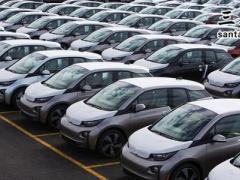新闻洗涤报:为什麽中国股市比经济有更多的政治性? [印度媒体]
中国股市一直以来和赌场与轮盘游戏相比更显讽刺,上周就道出了真相。1月7日周四,当沪深指数300(一个在上海的股票上市性能和深圳证券交易所的代表性指数)在约交易15分後被叫停,下跌7%触发了熔断机制。去年以前,沪深指数300在中国媒体所称的黑色星期一的一天内重挫了8.5%。
Why the volatility in Chinese markets is more political than economic
新闻洗涤报:为什麽中国股市比经济有更多的政治性?
China’s stock markets have been mockingly compared to casinos and the game of roulette. The previous week showed why. Trading halted in a matter of 15 minutes on Thursday, January 7, once the CSI 300 – an index representing the performance of stocks traded on Shanghai and Shenzhen stock exchanges – tanked seven per cent activating the circuit-breaker. Last year, CSI 300 fell 8.5 per cent on a day termed “Black Monday” by Chinese media.
中国股市一直以来和赌场与轮盘游戏相比更显讽刺,上周就道出了真相。1月7日周四,当沪深指数300(一个在上海的股票上市性能和深圳证券交易所的代表性指数)在约交易15分后被叫停,下跌7%触发了熔断机制。去年以前,沪深指数300在中国媒体所称的黑色星期一的一天内重挫了8.5%。
If the crashes are intimidating, the surges are luring – the same index had climbed 150 per cent in the year starting June, 2014.
如果暴跌是恐吓的话,那正勾起一场惊涛骇浪 – 同样的指数在2014年6月开始,已攀升150%。
The latest crash also hit the global stock markets. Fears of a Chinese economic slowdown meant markets such as FTSE, DAX, Dow Jones and BSE tanked by considerable margins.
最近的暴跌也刺激了全球股票市场。对中国经济放缓的担忧意味着如英国富时、德国综合指、道琼斯工业和孟买BSE指数也都宣告了大量收益的下挫。
Seesaw movements in stock markets are nothing new, but the Chinese markets have perplexed even the most seasoned investors. Clearing the air about the Chinese stock market requires answers to two crucial questions:
1. Why does it show such erratic movements?
2. What is the meaning and implication of these movements for China?
在股市的跷跷板走势早已不是什麽新鲜事,但是中国股市就连最丰富的投资老手都一头雾水。要拨开中国股票市场的迷雾需要两个关键问题的答案:
(一)为什麽股市表现出这种走势飘忽不定?
(二)这些行动对于中国来说的意义和意含是什麽?
Reasons behind the erratic movements
走势飘忽不定的背后原因
Thanks to government intervention, in the strictest sense of the word “market”, Chinese stock exchanges are not markets at all. A market is characterised by the freedom to move up and down depending on investor sentiment, with little government interference. This is not the case with Chinese markets, on which the government has staked its credibility – reducing them to the bellwether of its reforms for a market-oriented economy. These reforms include relaxing capital controls and letting Yuan levels be determined by market forces. For the government, a robustly performing stock market indicates that the people have more faith in its reform agenda.
多亏了政府干预,"市场"这一单词在严格意义上在中国证交所根本就不是市场。某A市场的特点是根据投资者的情绪自由地上下移动,而很少有政府干预。而中国市场不是这种情况,是由政府在其信誉上"画押" – 这减少他们为市场导向型经济的领先者进行改革。这些改革包含:放宽资本管制并让人民币由各家市场决定。对于一个政府来说,一个表现强劲的股市表示人民对其改革议程有更大的信心。
To encourage people to invest, the messaging went far beyond words. The Chinese government followed a loose monetary and fiscal policy, relaxed regulations on number of accounts allowed per investor (which went from 1 to 20 in April, 2015) leading to a massive upsurge in new accounts and trading volumes, and strongly encouraged margin trading (borrowing to buy stocks), all of which stoked the equities bubble. According to Wharton professor Franklin Allen, the upswing in the market starting June, 2014 “seems to be a liquidity-fuelled bubble made possible by extensive margin loans”.
为了鼓励人们投资,消息传的太远太快难以说尽了。中国政府遵循宽松货币和财政政策,放宽每名投资人的A股帐户数量的规定 (2015年4月后1人可从A股开20户),导致了新开帐户和交易量的大量高峰期,还大力鼓励保证金交易 (借款买股票),所有这一切都引发了股市泡沫。根据沃顿商学院教授弗兰克林·艾伦(Franklin Allen)的说法,从2014年6月开始市场处于上升阶段,「似乎是一个可能由大量制造的边际贷款引致流动性推高的泡沫。」
The bubble is exacerbated by the composition of investors in Chinese markets. Unlike Western capital markets, which are largely controlled by deep-pocketed institutional investors, Chinese markets are awash with capital from small, relatively unskilled investors. Due to inherent volatility, fraudulent practices, and limits on trading in the so-called A-shares listed on Chinese exchanges, it is estimated that only about 1.5 per cent of these shares are owned by foreign investors. Most Chinese investors are opportunistic, looking to make a quick buck. To them, panic and excitement come in equal measure. Their investments are driven by signals from the government.
股市泡沫被中国市场投资者的组成加剧了影响。与西方资本市场不同,在很大程度被由财力雄厚的投资机构控制,中国市场的资金充斥着金额较小、技术相当不熟练的散户。由于股市本身就有的波动、欺诈行为、以及对中国交易所所谓A股上市在交易上的限制。据估计,这些股票大约只有1.5%是由外国投资者持有。大多数中国股民都投机取巧,寻求快速致富,对他们来说恐慌和兴奋都是同样程度。他们的投资都是由政府发号令带头动起来的。
In this piece, commenting on the fickle-minded Chinese small investors, Wharton Professor Minyuan Zhao says, “Precise firm-level information is hard to come by, so many not-so-savvy individual investors are trading on sentiments, stories and their understanding of government policies,” and later holds them liable for causing market volatility.
在这一点上,对有投机心态的中国小小散户而言,沃顿教授评论说:「那些可达企业层次上的精确信息是很难获取的,有这么多不太精明的散户正在用情绪和它们对其官方政策的理解做股票交易,而在稍后为其市场波动产生责任。」
The third chart from this link should dispel any notions that the Chinese markets exhibit remotely normal behaviour. As further evidence of the bubble, the same shares listed in mainland as well as Hong Kong exchange were at a considerable premium in the former, at the peak of the bubble.
这个链接的第三个图表的概念应该消除(译注: CNBC对中国股市报导的连结,原网站有),那让中国市场表现出轻微地正常反应。随着股市泡沫进一步的证据,在大陆上市与香港交易所的同一股票都在可观的溢价,与前者都是位在泡沫的峰值。
What’s more interesting is that the biggest bubble was created largely in ChiNext – a group of start-up, largely technology-driven, stocks. According to The Economist, “ChiNext is supposed to be China’s answer to Nasdaq. At the moment it looks like precisely that in 1999, just before the dotcom bubble spectacularly burst.”
更有意思的是,最大的泡沫很大程度上由创业板(主要是技术驱动时一组启动股)创造。根据经济学人的说法,创业板本应是中国对纳斯达克的对应。目前,它看起来就像恰恰发生于1999年,就在互联网泡沫爆破不久的概念。
There is also strong speculation that the government inflated the bubble to help the debt-saddled state companies carry out in what would essentially be, according to Wharton Professor Marshall Meyer, the “world’s biggest debt-equity swap”. This means that the companies could pay off some of their debt by selling their highly-priced shares. The government tried to cook up a dream scenario where the state companies would be free of the debt burden, and the investors would be better off as well. As the latest crash shows, this win-win situation remains the stuff of dreams.
还有一种强烈的推测认为,政府刻意膨胀泡沫来帮助国企执行就是根据沃顿商学院教授马歇尔·梅耶的想法《世界最大的债转股互换》。这意味着公司可以通过出售一些它们的高价位股来还债。政府试图编造一个梦想的场景,国有企业可以自由地负担债务,然后投资者也将突破重围。由于最近的暴跌显示,这种双赢情况仍旧保持着梦里梦言。
The first major correction to the bubble came last year, on account of signals that the government wasn’t doing enough – by not further loosening monetary policy – to support share prices. The slump was led by relatively wealthy investors. Markets lost 30 per cent in a matter of three weeks. Due to relaxed capital controls and waning confidence, the crash was accompanied by flight of foreign capital. More than the investors, this spooked the government: PBoC reversed its prior decision to allow Yuan to float freely, the government imposed stricter capital controls, suspended trading, debarred big investors from selling their shares en masse, arrested many over accusation of fraudulent trading, and in a death blow to its reform agenda, it pumped in over $230bn in the markets to re-inflate the bubble. To counter the sharp slide in Yuan triggered by record forex outflow, PBoC burnt through several hundred billion dollars of reserves last year. Yuan, and thus the forex reserves, continue to be under pressure.
第一次修正泡沫去年来了,因为政府的暗示做得不够,已通过不会放松货币政策的方式来支持股价。这次暴跌是由相对富裕的投资者主导。市场在三周内失去了30%。由于放松了资本管制和信心衰退,暴跌伴随着外国资本的外逃。超过太多投资者吓坏了政府,中国央行扭转了之前的决定,允许人民币自由浮动,政府实行严格的资本管制、停牌交易,阻止大户投资人集体出售股票,逮捕许多涉嫌诈欺性交易和在对股市下挫同时展开应对改革,在市场注资超过2300亿元重新吹大了泡沫。为了应对大幅下滑的人民币创纪录的外汇流出,中国央行去年烧光了数千亿美元的外汇储备。人民币和其外汇因此还继续受到压力。
Instead of calming investors, government’s reactionary policy only undermined confidence in the markets, setting the stage for the second correction, which came in the first week of January. Further, the circuit-breakers, instead of calming investors, might have accelerated the mad rush to dump stocks by exerting a so-called ‘magnet effect’, which encourages investors to sell shares before trading halts. For S&P500, circuit-breakers are much better spaced out at 7, 13 and 20 per cent to avoid precisely this effect. Besides, American markets are far more mature than their Chinese counterparts, and even a 7 per cent drop would be a rarity. On the other hand, Chinese markets often saw 5 per cent drops during regular trading days before the circuit-breaker was introduced. The magnet effect kicked in when investors realised they had little time to sell before the market closed for the day. Recognising this folly, China has suspended the circuit-breaker.
政府的保守政策不但偷偷破坏了市场的信心,反而为二次修正铺好了舞台,就在1月份的第1周来到。进一步地,触发熔断机制,反倒没有冷静的投资者,可能会通过"磁石效应"的产生加速地清单,这表示鼓励投资者在暂停交易前抛售股票。对标准普尔500指数来说,熔断机制是更好地隔开在7%和13%和20%,正是避免这种效果。此外,美国市场比他们的中国同行更加成熟,甚至7%的下跌会是一个罕见情况。另一方面,在熔断机制引入以前,中国市场在常规交易日经常看到5%下跌。磁石效应中招了,当投资人意识到他们只有很少的时间在市场关闭交易日以前出售。承认了蠢事,中国已经暂停了熔断机制。
Instinctively, such large and recurring crashes in stock markets seem like a statement of doom for the Chinese economy. But just as the bubbles were not grounded in economic reality – good or bad – the crashes are largely disconnected from it too. This is asserted by the economist Eswar Prasad, as well as by a paper co-authored by Wharton professor Franklin Allen, according to which stock market returns in US, UK, Japan, Russia etc. are strong predictors of GDP growth. Further, the paper says. “The correlation between market returns and future GDP growth for China, however, is much lower and statistically insignificant.”
直觉地说,在股市如此大和经常的崩跌似乎是一个中国经济厄运的表现。但正如泡沫没有在经济现实中降落,不管好与坏,股市暴跌也在很大程度上已经被中断了。这是被经济学家埃斯瓦尔•普拉萨德(Eswar Prasad)主张的,同与一名沃顿商学院的教授弗兰克林·艾伦也是共同主笔人,根据有关在美国、英国、日本、俄罗斯等等的股票市场回报...。该报告中说,"对于中国市场的回报和未来GDP增长率的相关性,在统计学的意义要低得多。"
This is largely because unlike Western countries, where stock market capitalisation is over 100 per cent of GDP, China’s stock market capitalisation is only about 40 per cent of its GDP. Further, The Economist reports that less than 15 per cent of household financial assets are invested in the stock market, compared to much higher shares in Western countries. Firms are far less dependent for financing on stock market than on debt.
这主要时因为与西方国家不同,在西方股票总市值占GDP超过100%,中国的股票总市值只有约其GDP的40%。另外,经济学家的报告说,相对于西方国家高一些的股票投资,中国的家庭金融资产投资于股票市场低于15%。企业更少比债务依赖于股票融资。
The volatility in Chinese markets is actually much more a political statement by investors against the government than an economic one. The incessant flip-flops of the government, and its failure to boost markets despite its desperation, have raised questions over its will to introduce market-oriented reforms as well as its competence. Investors fear that the government will abandon its “crossing the river by feeling for stones” (a phrase coined by Deng Xiaoping) policy towards liberalisation and intervene heavily in the markets as and when it sees them deviating from the script, which means serious investors, including foreign ones, will probably keep out, leaving the opportunistic ones to wreak havoc.
在中国市场的波动事实是比经济上更是一个投资人对抗政府的政治声明。在政府不断熔断,尽管在无奈之下其未能提振市场,也已提出了其意愿想引入市场化改革,以及它的竞争力。投资者担心政府将放弃"摸着石头过河"(邓小平创造的一个短语)的自由化政策,并在看到违背剧本时大力干涉市场,这意味着严谨的投资人,包含外国投资人,很可能会甩手入场,伺机而燃燎原之火。
Sharma
Prabhat, over all well written and summarized piece. However, title is misleading, the moment I read, I had in my mind, here comes one more trying to sell not his cup of tea.
By your logic subprime crisis also government induced, as was in 2007 and now, why only around this time? Though there is ample data for China seems to be moving to IFRS9 and NPA was 14-21% of GDP by various independent research while official figure was 1.5% to 2% 2013$ terms, you guessed it right these all has to go off the book by 2018 hence it's more of house cleaning but Feds increased the rate so now it's reverse capital flight that made problem worse, they pumped ~500-700Bn$ by duations but still that's not enough. On top of that oil prices have gone down so bad that there is deflectionary fears
整体写得很好并总结了的文章。然而,在我读的时候标题在误导。我有一种感觉,你来的这杯茶不是它要卖你的那杯。
根据你的逻辑,次贷危机也是政府引起的,并在2007年发生那现在呢?为什么只有这个时候?虽然中国有充足的数据似乎被转移到IFRS9,那由各家独立研究的不良资产率可是GDP的14%-21%,虽然与官方数字2013年的1.5%到2%还差了些。你猜的这些都是对的都可以去出书了,那2018年是打扫屋子的时机,但是美联储提高利率了所以现在是反向资本外逃,问题变得更糟,他们通过货币贬值投了~5000亿到7000亿,但还是不够。还不止如此,石油价格已经降的很糟都有了通货紧缩的恐惧。
Prabhat singh
Thanks for the constructive comment.
I would say the government surely had a big role to play in the subprime crisis, but not because of excessive intervention (as in China's case), but because of excessive deregulation of banks and insurance companies (AIG could issue CDSs worth such gargantuan amounts because there was virtually no regulation).
That said, the US gov did commit Chinese government-like heresies too. The Community Reinvestment Act, support extended to Freddie and Fannie, and positive signalling by Greenspan went a long way in encouraging the housing bubble.
And yes, Fed's increase of rates must be a contributing factor in the flight of capital. Deflation is indeed a threat which is why rates have been cut by PBoC, but that means spending more forez reserves to defend the currency.
(作者回) 感谢建设性意见。
我会说,政府肯定曾在次贷危机中发挥了很大的作用,但不是因为过度干预(就如中国的例子),不过因为银行和保险公司造成的(AIG可以发行如此大数额的信用违约交换由于当时基本没有监管)。
即便如此,美国政府也作承诺像中国政府那样的乱搞,通过《社区再投资法》,支持扩展到房地美和房利美,然后由格林斯潘积极地号令,走了很长的路鼓励房地产泡沫。
是的,美联储的利率上升肯定是资本外逃的一个影响因素。通货紧缩的确是一个威胁,这就是为什么中国央行削减利率了,但那也意味着花更多的外汇储备来捍卫货币。
版权声明
我们致力于传递世界各地老百姓最真实、最直接、最详尽的对中国的看法
【版权与免责声明】如发现内容存在版权问题,烦请提供相关信息发邮件,
我们将及时沟通与处理。本站内容除非来源注明五毛网,否则均为网友转载,涉及言论、版权与本站无关。
本文仅代表作者观点,不代表本站立场。
本文来自网络,如有侵权及时联系本网站。
图文文章RECOMMEND
热门文章HOT NEWS
-
1
चाइना में रेडी और ठेले Local shops in china || L...
- 2
- 3
- 4
- 5
- 6
- 7
- 8
- 9
- 10
推荐文章HOT NEWS
-
1
चाइना में रेडी और ठेले Local shops in china || L...
- 2
- 3
- 4
- 5
- 6
- 7
- 8
- 9
- 10











